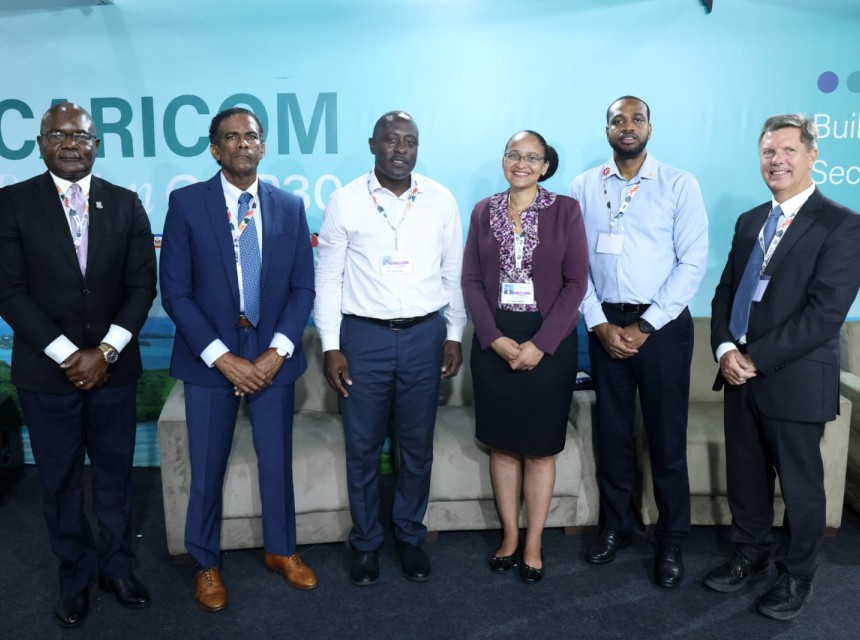Press Release
Release Date: 18 November, 2025
November 2025
The VI Climate Change Trust Fund Garners Support at International Climate Change Conference in Brazil ahead of 2026 Launch
The Virgin Islands hosted a series of side events that showcase the novel Virgin Islands Climate Change Trust Fund (VICCTF) and regional innovative financing solutions at the 30th Conference of the Parties to the United Nations Framework Convention on Climate Change (COP30) in Belém, Brazil.
The climate finance event series, hosted in partnership with the Caribbean Community Climate Change Centre, took place at the CARICOM Pavilion on 13th and 14th November, 2025 and led to endorsements and partnership commitments from key regional and international partners. Event details are available at www.vicctf.org.
The first event held on 13th November featured remarks and presentations by regional partners and members of The Virgin Islands delegation Permanent Secretary in the Ministry of Environment, Natural Resources and Climate Change and ex-officio member of the Trust Fund Board, - Dr. Ronald Berkeley, Chairman of the Trust Fund Board, Mr. Edward Childs, and Director of Environment. Ms. Angela Burnett Penn, Climate Envoy for the Premier, Dr. Kedrick Pickering.
Dr. Pickering also served as Minister when the Climate Change Trust Fund Act was passed in 2015 and noted the significance of the bi-partisan support enjoyed by the Trust Fund.
In his remarks at the opening sensitisation event, Dr. Berkeley, in explaining the significance of the Fund, highlighted that, “Our experience with Hurricane Irma taught us one critical lesson: resilience cannot be financed after the storm.” Dr. Berkeley’s remarks were followed by Mr. Daniel Best, President of the Caribbean Development Bank who added that “despite our vulnerability, access to predictable, adequate, and direct climate finance remains a persistent challenge.
For the Overseas Territories in the Caribbean, this challenge is even more urgent, as they are excluded from key global climate finance mechanisms that are accessible to other Small Island Developing States. To address this challenge, The Virgin Islands, a Borrowing Member Country of the Caribbean Development Bank, took the bold step to establish a Climate Change Trust Fund, which we are highlighting today. This signals that Caribbean Small Island States are not waiting – we are leading, we must, because our survival depends on it.”
VICCTF is designed to mobilise, manage and disburse climate finance for priority climate adaptation and mitigation initiatives outlined in The Virgin Islands Climate Change Policy to achieve a climate-smart island chain.
Director Burnett Penn explained the design principles of the Trust Fund and identified the sectors that can be supported by the Trust Fund, including the environment, agriculture, fisheries, tourism, insurance and banking, human health, critical infrastructure, human settlements, water resources and energy.
She also gave examples of specific priority projects that can be funded, such as mangrove lagoon restoration, a low-interest loan facility for the tourism, agriculture and fisheries sectors to make businesses greener and more disaster resilient, resilience building for the water distribution system, coastal defences, flood mitigation works for Road Town and renewable energy installations.
Mr. Edward Childs, Chairman of the Board highlighted that the Trust Fund is legally established as an independent, permanent, nationally-owned financial mechanism, guided by international fiduciary standards and aligned with global frameworks such as the Paris Agreement and 2030 Agenda for Sustainable Development. Its operations are guided by strong fiduciary standards, environmental and social safeguards and a commitment to inclusive, sustainable development.
Mr. Childs also emphasised that as Chairman of the Board he will focus on ensuring that there is fair and equitable access to the Fund by all sectors and actors, including the private sector, non-government organisations, community organisations and academia.
Executive Director of the Caribbean Community Climate Change Center Dr. Colin Young, praised The Virgin Islands initiative as a best international practice model of how small island economies can meet global climate challenges.
The Virgin Islands Climate Change Trust Fund will also serve as a regional demonstration platform for innovative climate finance mechanisms, knowledge sharing and private sector engagement. Its governance structure includes public, private and civil society representatives to ensure transparency and inclusivity.
Dr. Young commended The Virgin Islands for its leadership in establishing a national financing mechanism with seed funding from the Environmental and Tourism Levy that serves as a model that other small island coastal states and Overseas Territories can replicate.
The series of side events led to a number of immediate tangible outcomes to advance the operationalisation of the Trust Fund, including an agreement in principle for a partnership with the Caribbean Development Bank and the UN Resident Coordinator’s Office in Barbados and the Eastern Caribbean to develop and implement a Capacity Building Strategy for the Trust Fund.
The Strategy will not only ensure that the Trust Fund has the necessary qualified staff but ensure that local businesses and organisations have the necessary training and know-how to prepare project proposals for funding by the Trust Fund and to successfully implement their funded projects.
Beyond the Strategy, the Trust Fund secured the commitment of support from the successful Antigua and Barbuda Sustainable Island Resources Framework (SIRF) Fund, by way of sharing lessons learnt, including on capacity building.
Engagements also led to expression of interest from the Caribbean Centre for Renewable Energy and Efficiency to support the development of an Integrated Resources Plan to sustainably transition the Territory to renewable energy.
Other regional and international organisations represented sat the events and engaged before and during COP30 pledged their support to the successful roll out of the Trust Fund, including the Caribbean Community Climate Change Centre, Caribbean Biodiversity Fund, Green Overseas Programme, Caribbean Climate-Smart Accelerator, Island Innovation, and Organisation of Eastern Caribbean States (OECS) Commission, the latter of which identified potential opportunities for regionalisation of the Trust Fund.
For Additional Information Contact:





